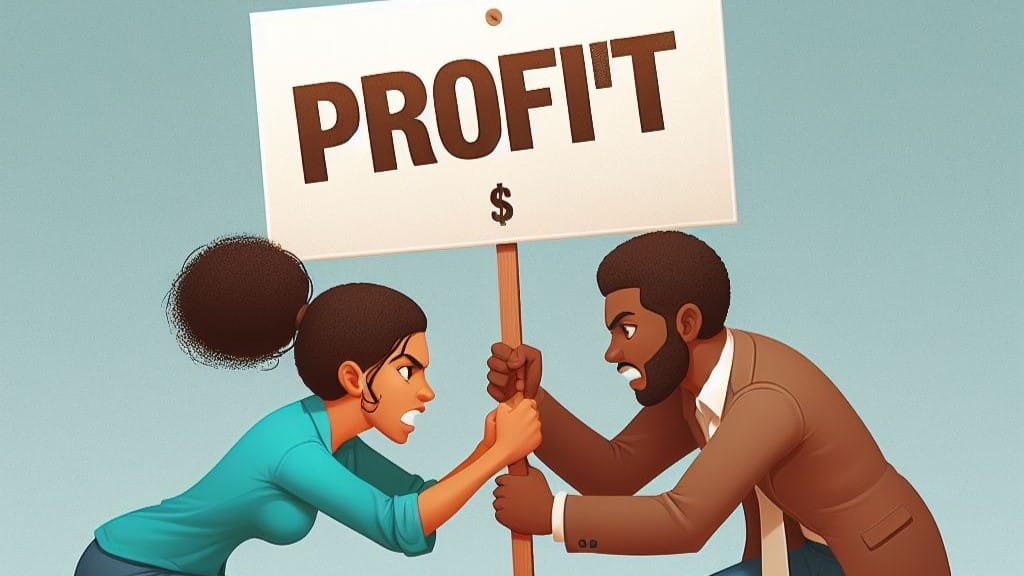What goes up...
It was an eventful week in and out of markets. We still heard about the strong shilling and some of the volatility could easily worry an observer. But by the end of this edition, you should be more confident with whatever the markets throw at you this week because what goes up, can do many things. And going up isn't always a good thing.
These are the main stories that caught our eyes and ears in the week:
- Market cap drops
- T-Bill rates drop more
- Loan defaults rise
In case you're wondering...yes, there's light at the end of this tunnel. It may be a bumpy (but informative) ride.
SPOTLIGHT
Big banks pay big bucks

A dividend is a distribution of a portion of a company's earnings to its shareholders, typically in the form of cash or additional shares of stock.
What happened?
Listed banks' latest dividend payouts covering the year ended December 2023 made up 48.9% of the cumulative dividend pay outs from all listed companies. Sentiment: Positive
Between the lines
Dividends are a core aspect of equity investments. Three reasons to pay more attention to them:
- Income Stream. Dividends provide a reliable source of income, offering regular cash payments that can supplement other forms of income.
- Total Return. Dividends contribute to the total return of an investment, enhancing overall performance and potentially increasing long-term wealth accumulation.
- Stability & Confidence. Dividend-paying stocks often demonstrate greater stability during market downturns and signal confidence in the company's financial health and long-term prospects.
Should you care?
Dividends play a crucial role in investing by providing income, enhancing total return and instilling investor confidence. They also encourage disciplined corporate behavior. Dividends are an essential component of a well-rounded investment strategy.
HEADLINES
The week's big stories
- Market cap drops: Profit-taking by investors at the Nairobi Securities Exchange (NSE) in the past two weeks cut investor wealth by Ksh127.4 billion ($968.8 million) over the period, led by bank stocks whose prices have fallen despite the shares qualifying for final dividends. Read on to learn about profit-taking in this week's Insight section.
- T-Bill rates drop more: The interest rate on the 91-day Treasury bill fell by the largest weekly margin in 9.5 years at last week’s auction, giving the clearest signal yet that interest rates on government debt are set to come down. The fall in short-term rates has been driven by change in investor sentiment. This is a developing trend to observe as it will impact investment returns in the near term.
- Loan defaults rise: Total loan provisioning costs by listed banks rose to Sh120.8bn in FY2023 vs Sh74.1bn in FY2022 as a precaution to cover expected credit losses as loan defaults soared. A high interest rate environment is a double-edged sword as shaky economy leads to increasing loan defaults from borrowers despite higher income for depositors.
INSIGHT
Explained by AI (and I): Profit-taking

Profit-taking (or 'booking profits') in financial markets refers to the practice of selling an investment that has increased in value to realize the gains. It's a strategy employed by investors to lock in profits and capitalize on price appreciation.
Here's how profit-taking works:
- Buying Low, Selling High: Investors purchase assets such as stocks or bonds with the expectation that their value will increase over time. When the asset's price rises significantly, reaching a level where the investor believes it may have reached its peak or is overvalued, they decide to sell to capitalize on the gains.
- Realizing Gains: By selling the investment at a higher price than they paid for it, investors realize a profit. This profit is considered "paper gains" (remember this term?) until the asset is sold, at which point it becomes realized gains.
- Risk Management: Profit-taking also allows investors to reduce their exposure to potential losses if the market experiences a downturn or if the asset's price reverses direction after reaching a peak.
- Market Psychology: Profit-taking can be influenced by market sentiment and investor psychology. When a significant number of investors start selling to take profits, it can lead to downward pressure on prices, triggering a broader sell-off in the market.
Overall, profit-taking is a fundamental aspect of investing, allowing investors to capitalize on price appreciation, manage risk, and optimize their investment returns. However, it's essential to balance profit-taking with a long-term investment strategy and consider factors such as tax implications, transaction costs, and potential missed opportunities for further growth.
"The best chance to deploy capital is when things are going down." -Warren Buffet
ICYMI
Quick takes
- Banking is pay-to-win. Interest paid out on customer deposits rose by 48.2% in FY2023 compared to 2022. 9 of the 10 listed banks in Kenya had their interest expenses on deposits rise faster than interest income on loans & advances, mirroring an escalation in payouts to term depositors in contrast to interest charged on borrowings. Banks had to pay higher interest to keep customers who had better alternatives such as MMF's.
- Shining shilling may lose its sheen. Currency value changes induced by sentiment or intervention are not sustainable. To keep the strong shilling sustainable requires strong economic fundamentals. Lower interest rates will reduce the attractiveness of the shilling.
- CBK reining in rates. The Central Bank of Kenya raised Sh34.7bn from its auction of a re-opened two-year bond at a weighted average rate of 16.9922%. The paper was oversubscribed by 17.9% with investor bids totalling Sh47.1bn against Sh40bn on offer. Rates likely to continue trending downward.
One liners
Bonds maturity falls on short-term paper surge [Business Daily]
Bamburi Cement Plc Posts Net loss of KSh 399M [Kenyan Wall Street]
Liberty Kenya Holdings Plc Posts Net Profit of KSh 671.9M [Kenyan Wall Street]
Safaricom boost as Ethiopia slashes termination charges [The East African]
REGION
What in the East Africa?
[UG] Uganda's Economy on Strong Footing, Growth Projected at 6%: The upcoming financial year (FY 2024/25) is anticipated to witness a growth rate of 6.4%. This continued upward trajectory will be driven by sustained growth in core sectors, strategic government investments, and a flourishing regional trade environment. [Link]
[UG] Shares worth sh2b exchange hands: Shares worth slightly over sh2b exchanged hands, compared to sh96m previously at the Uganda Securities Exchange (USE). Stanbic led in turnover, dealing worth over sh1.1b or 56.25% of the weekly turnover. [Link]
[TZ] CRDB proposes highest ever dividend of TZS 50: The dividend came after the bank’s impressive financial results for the year ending December 2023, demonstrating a remarkable 21% growth in profit after tax. CRDB, the largest bank in terms of balance sheet, saw its net profit surging from 351bn/- in 2022 to 423bn/- last year. [Link]
[TZ] Tanzania’s current account deficit maintains downward trend: Current account deficit narrowed to USD 2,701.4mn in the period ending February 2024 compared to USD 5,133.6mn in 2023 largely driven by the decrease in import bills. The decline in imports of goods and services was noticed largely in refined white petroleum products, fertilisers and plastic items. [Link]
[RW] Rwanda’s headline inflation eased to 4.2% in March: Rwanda’s headline inflation eased to 4.2 per cent in March 2024, from 4.9 per cent in February 2024, according to the latest Urban Consumer Price Index (CPI) published by the the National Institute of Statistics of Rwanda (NISR). This was the fourth consecutive month that headline inflation eased into the BNR target range of 2-8 per cent. [Link]
[ET] NBE Launches Ethiopia’s QR Code Standard to Boost Digital Payment: The national QR code standard was introduced in the recent the Digital Payment Conference held by the National Bank of Ethiopia (NBE). The standard, the NBE said this week, “makes the existing scattered QR code payments interoperable.” [Link]
[ET] NBE sets sights on “concentrated” borrowing in banking industry: Loans and advances from the banking industry are “concentrated in the hands of a few large borrowers,” according to an NBE Financial Stability Report released on April 11, 2024. The report disclosed that no more than 10 borrowers accounted for 23.5 percent of all loans and advances from the entire banking industry in 2023. The figure was 18.7 percent the year prior. [Link]
CURIOUS
Two good not to share
One: As you kick off your week, here's one to think about. In this short video, James Suzman takes a very interesting look at the 40-hour work week and the jobs we have invented to stay busy. It is a thought-provoking idea that might have you questioning your job by the end of it (in a good way).
Two: This goes to two Kenyan race winners and two world records at a single event! This year's London Marathon registered 578,000 participants, making it the most popular marathon in the world. Kenyans, Alex Munyao & Peres Jepchirchir won the respective men's and women's elite races in a record-breaking win for Peres. Such performances make it hard for the world not to believe that all Kenyans are great runners!
That's it for today. Whether you consider the week ahead a marathon or a sprint, I hope you come out ahead, Kenyan or otherwise. Have the best one possible.
Yours truly.
Get This Weekly | Buy Me A Coffee | Feedback | Follow My X | My Band
